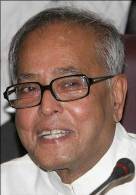 Finance Minister Pranab Mukherjee said food inflation, which stands at over 16 per cent, will begin to come down after the middle of next month on the back of good monsoon.
Finance Minister Pranab Mukherjee said food inflation, which stands at over 16 per cent, will begin to come down after the middle of next month on the back of good monsoon.
Addressing senior executives of financial services firms in Washington on Monday, Mukherjee also said containing oil prices and fiscal deficit are two major challenges before the Indian economy along with taming high inflation, currently running into double digits.
"Inflation in food articles was more than 17 per cent for a long time which will start declining after the middle of July, 2010 as the monsoon is expected to be normal this year," he said.
Monsoon accounts for 80 per cent of rains India receives and 60 per cent of the area under cultivation is rain-fed. Last year, the country's crop production was hit owing to poor rains, leading to an upward spiral in food prices.
Mukherjee attributed high inflation to constraints in supply side of food articles which include cereals, pulses, edible oils and sugar among others. Driven by spiralling prices of essential items, inflation surged to double digits at 10.16 per cent in May, the highest in the last 19 months.
Besides food items, inflation has spread to manufactured items including metal, textiles and plywood. The finance minister said another challenge before the Indian economy is to contain the oil prices as it has to import more than 70 per cent of its demand from outside.
The empowered group of ministers, headed by Mukherjee, will consider raising petrol and diesel prices by Rs 2-4 per litre on Friday in Delhi. The Finance Minister also said the first challenge before the country is to return to the path of fiscal consolidation and bring down fiscal deficit to 5.5 per cent this fiscal and 4.1 per cent next year.
Fiscal deficit climbed after the government provided stimulus since December, 2008 to cushion the economy from the global financial crisis.
The government was mandated by a legislation to cut deficit, excess of its expenditure over receipts, to three per cent of GDP during 2008-09, but it more than doubled to 6.1 per cent of GDP because of the stimulus.
For 2009-10, fiscal deficit rose further to over 6.6 per cent of GDP. This fiscal, the government projected fiscal deficit at 5.5 per cent of GDP. But over Rs 1 lakh crore realisation from the sale of 3G and broadband wireless licences will help it bring it down to 4.5 per cent of GDP.
The Finance Minister said he endorses the prediction made by IMF that India will achieve 8.8 per cent growth in 2008.